FIDE World Youth U16 Chess Olympiad 2025: Registration deadline extended

FIDE and the Colombian Chess Federation (FECODAZ) have announced that the registration deadline for participants in the World Youth U16 Chess Olympiad has been extended to July 1, 2025. World Youth U16 Chess Olympiad will take place in Barranquilla, Colombia, from August 16 to August 23, 2025. All FIDE member federations have the right to send one team as the invited team. Each team must consist of four players—with representation of both boys and girls—and one team captain. The tournament will be a 9-round Swiss system, but if fewer than 40 teams register, only 7 rounds will be played.Each team match will be played on four boards. Pairings, scoring, and tiebreak rules will follow the FIDE Pairing Rules for the Chess Olympiad. The time control is 45 minutes plus a 10-second increment per move, starting from move one. Official website: youtholympiad2025.fide.com E-mail: youtholympiad@fide.com Invitation letter, regulations, schedule (PDF)
Mongolian Chess Federation President appointed as nation’s Prime Minister
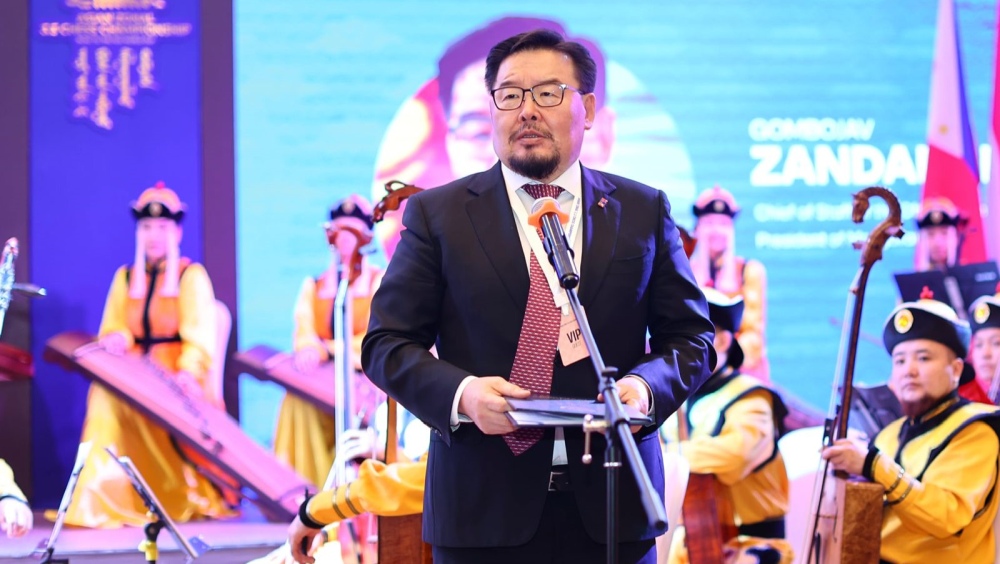
His Excellency Zandanshatar Gombojav, the acting President of the Mongolian Chess Federation, was approved as the Prime Minister of Mongolia by the State Great Khural (Parliament) at its plenary session on June 12. Apart from being the President of the Mongolian Chess Federation, from 2019 to 2024 Zandanshatar Gombojav served as the Chairman of the Parliament of Mongolia. He has worked in the fields of academic research, economics, and foreign affairs, as well as at the state legislative and executive levels since 1992. FIDE President Arkady Dvorkovich extended his congratulations to Mr Gombojav on his appointment. “Your elevation to the highest executive office in Mongolia comes at a time when your vision, experience, and political wisdom are most needed,” Dvorkovich stated. The FIDE President further highlighted that, as the head of the Mongolian Chess Federation, Gombojav has been a steadfast advocate for the growth and promotion of chess, both as a competitive sport and an educational tool. “Under your leadership, Mongolia has made remarkable progress in developing its chess culture and nurturing young talents. FIDE deeply appreciates your efforts in integrating chess into national programs and international cooperation. We are confident that your new role will offer further opportunities to advance the values of strategic thinking, education, and international collaboration – principles that chess embodies and promotes globally”.
FIDE WRBTC 2025: Hexamind level with MGD1 at the top after three key wins
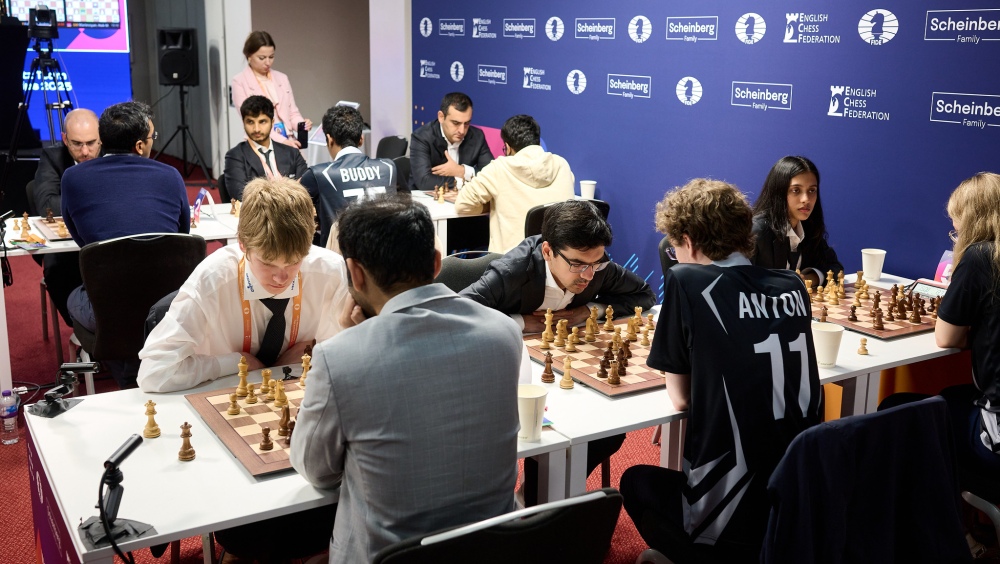
Day two of the FIDE World Teams Rapid Championship brought unexpected turns, as underdogs broke through and favourites faltered. With six match victories, one draw and one loss each, Hexamind and team MGD1 share first place with 13 matchpoints. Freedom and Uzbekistan follow closely behind, on 12, with Germany and Friends joining them after a standout performance. Tournament favourites WR Chess are in sixth place, with their title hopes dented by back-to-back losses. More intensity and pressure The stakes went up, and the matches became tougher as the FIDE World Rapid moved to its second day, with four more rounds taking place. The ceremonial first move was made by Lord Dafydd Wigley, a prominent Welsh and British politician between 1980 and 2000 and Vice Chair of the All Party Parliamentary Group on chess in the British parliament. Team MGD1 continued their strong performance, maintaining the lead through the day, winning two matches and drawing one. A key factor in MGD1’s success so far has been their amateur board player, Atharvaa P Tayade (rated 1952; pictured below), who has won all eight of his games. After a draw with Freedom in round five, the Indian-led team overcame top seeds WR Chess in round six with 4:2. In round seven, following a tough match, MGD1 scored a narrow 3.5:2.5 victory over Germany and Friends (which moved up the scoreboard, stunning Freedom in round six and finishing the day with a confident 4.5:1.5 victory over Malcolm’s Mates). However, in the final-eight round of the day, MGD1 was facing Hexamind. The team led by Levon Aronian had a great run on day two, drawing with Freedom and defeating WR and Turkish Airlines with 4:2, to reach second place before the final round. Rating favourites WR had a bruising day. They started well with a victory over Malcolm’s Mates, but then had two back-to-back defeats in rounds six and seven, to MGD1 and Hexamind. A 4.5:1.5. victory in round eight against Barys from Kazakhstan helped salvage some ground. In the final match of the day, Hexamind (with Volodar Murzin on board one instead of Levon Aronian) came out as winners, delivering a crushing 4:2 blow to MGD1, tying for first place. Here follows a closer look at the developments in rounds five to eight in the FIDE World Rapid Teams Championship: In round five, playing on the top tables, day one leaders Team MGD1 faced Freedom. Former World Champion Vishy Anand secured Freedom an early lead after dismantling world number three player, Arjun Erigaisi with black pieces. The match finished 3:3, with all other games ending in a draw, and Freedom’s non-professional player Sarbartho Mani succumbed to Atharvaa Tayade of MGD1. The British squad Malcolm’s Mates put up a fierce fight against the tournament favourites WR Chess. WR’s top player Alireza Firouzja found himself with seconds on the clock in a very sharp position against Gawain Jones, but still managed to win. Hikaru Nakamura defeated England’s Michael Adams after playing better in time trouble. WR’s team owner and player on the non-professional board, Wadim Rosenstein – lost on the last board, but his team still won: 3.5:2.5, securing two matchpoints. With this victory, WR tied with MGD1 for first place. KazChess dropped a win against Rishon LeZion Chess Club. The team from Kazakhstan were in the narrow lead as the last game of the match was played between former world champion candidate Boris Gelfand and world-class player Richard Rapport. Gelfand was pushing to swing the result in his team’s favour and, eventually, under time pressure, Rapport made a slip and lost. Hexamind Chess Team drew with the squad of Uzbekistan, with Levon Aronian losing to Uzbek superstar Nodirbek Abdusattorov. In other notable results from the round, Vincent Keymer lost to Alan Pichot despite playing with the white pieces. Nihal Sarin lost to the rising Argentinian prodigy Faustino Oro in a tense game. The 2702-rated super-GM Alexei Shirov lost as white to more than 200 points lower-rated Ameet K Ghasi. Round six started with a minute of silence for the tragedy in India which happened on Thursday morning, after a London-bound Air India plane carrying 242 people crashed shortly after take-off in Ahmedabad, Western India. After a draw with Freedom, Team MGD1 was playing WR Chess. The Indian team was pressed hard by WR as they created promising positions on most of the boards. However, as the round progressed, WR got only four draws and MGD1 scored a victory on board three, where David Anton outplayed Duda. The last game of the round to finish was between WR’s Wadim Rosenstein and Atharvaa P Tayade of MGD1. Rosenstein found himself in a difficult position, but there was also a complaint from the opposing team relating to touch and play. The game ended with Rosenstein losing, securing a 4:2 victory for MGD1. The round’s biggest upset came as Germany and Friends stunned Freedom, 3.5:2.5. Germany’s top player Vincent Keymer led his black pieces to victory against Freedom’s Rauf Mamedov on board one. After starting the day with a loss, Malcolm’s Mates came back with a crushing 5.5:0.5 victory over Team Hungary. One of the most exciting games of the day was played in the match between Hexamind and the Turkish Airlines Sports Club. On board one, 11-year-old Argentine prodigy Faustino Oro put up stiff resistance against the experienced heavyweight Levon Aronian. In a sharp endgame, Aronian (playing as Black) emerged with an extra pawn. Under extreme time pressure, both played very precise moves, but Oro ultimately blundered. The final moves of the game saw Oro playing with a queen and a knight against two queens, with no pawns on the board. Despite the pressure, Aronian kept his nerves and scored a victory. Hexamind won the match 4:2. In round seven, MGD1 continued their strong form in round seven, defeating Germany and Friends 3.5:2.5, though it was not without its challenges. Their top board, Arjun Erigaisi, lost to Vincent Keymer after blundering in an even endgame. On board
Early surprises at the start of FIDE World Rapid and Blitz Team Championships
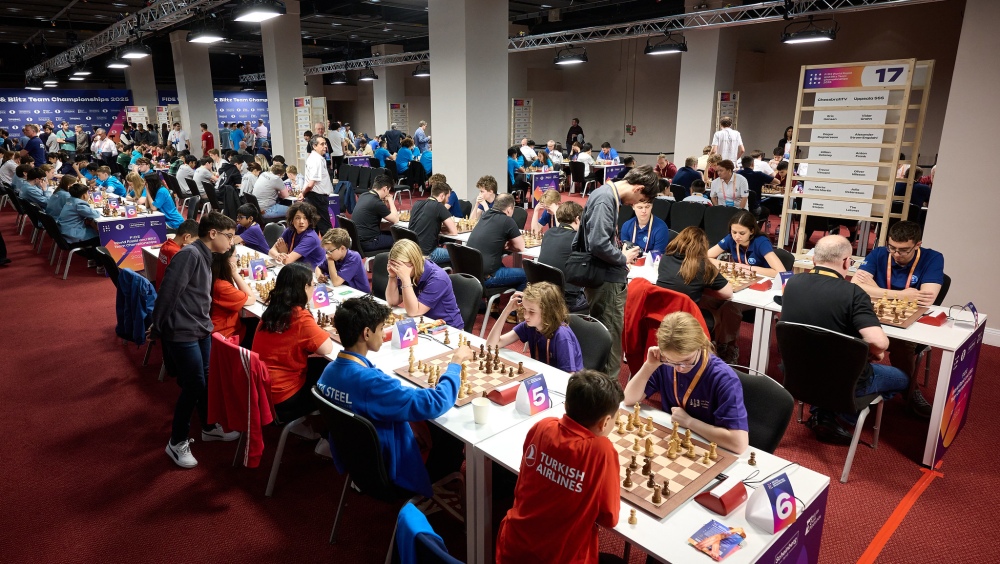
After four rounds in the Rapid segment, India’s MGD1 stands as the sole leader, having secured victories in all four matches. Three teams share second place – the favourites WR Chess and Freedom, as well as the newcomers to the competition, the British team Malcolm’s Mates. The global chess spotlight converged on the British capital on Wednesday for the start of the FIDE World Rapid and Blitz Team Championships, drawing many strong players and amateurs for a week of intense, fast-paced competition. The opening ceremony, held at the London’s Novotel Hotel in Hammersmith (close to where the world championship match between Kramnik and Kasparov took place in 2000), underscored the sport’s expanding international footprint and the power of chess in bringing people together. Dominic Lawson, the president of the English Chess Federation, noted that the World Teams is the first major FIDE event since the Candidates in 2013. He spoke about London’s rich chess history, particularly referencing the great Vera Menchik, the world’s first woman chess champion, who was killed in the German bombardment of London in 1944, noting how war – then and today – has impacted chess. The President of the International Chess Federation (FIDE), Arkady Dvorkovich, stressed the importance of events such as the FIDE World Rapid and Blitz Teams in bringing people together. “From Dusseldorf in 2023, to Astana in 2024 and now London – the event has grown in scale, passion and energy. I am sure this event will also be a great success story,” the FIDE President said. Dvorkovich also thanked the Scheinberg Family for their generous support for this event and for chess over the years. Nobel Prize-winning biologist and former Royal Society President Venkatraman Ramakrishnan had the honour of making the first ceremonial move. Originally from India, he took up chess at 19 after moving to the US and briefly played for Ohio University. “I played so much my studies suffered, so I stopped,” he recalled. In an interview, Ramakrishnan pointed out that “AI has revolutionised chess as much as it has revolutionised science”, citing the influence of Demis Hassabis – a prominent chess player and AI pioneer. The FIDE World Rapid Teams – first four rounds The first event underway is the World Team Rapid Championship, featuring 52 participating teams. While rating favourites generally performed strongly, the Rapid opening day saw notable upsets, with several super-Grandmasters dropping points to significantly lower-rated opponents. The top-performing team of the day is MGD1 from India, led by Arjun Erigaisi, which has won all four matches, securing eight match points (each match victory brings two points, each draw one point, and a loss – zero points). They started with a 5:1 victory against MongolZ and continued in the same fashion in round two, against Barys.kz. Round three saw them pitted against Rishon LeZion Chess Club, led by the former world champion candidate, Boris Gelfand. The score in this match was 4.5:1.5 for MGD1. Then, in the final round of the day, the Indian squad narrowly defeated the strong team of Uzbekistan, 3.5:2.5, finishing the day in sole first place. Second and third place are shared by two top contenders from previous editions – WR Chess and Freedom. Both teams won their first three matches but drew against each other in the fourth round and are on seven match points. The big surprise of the day is the distinctly named team Malcolm’s Mates (after the ECF chess official and organiser Malcolm Pein), which emerged in shared second to fourth place with WR Chess and Freedom. They drew their second match – against Global Ramblers, led by GM Alexei Shirov – but then went on to win in the next two rounds, to clinch one of the top spots. Here follows a closer look at developments in the first four rounds: The first round brought the first surprises! Despite all the favourite teams winning their matches, there were some notable upsets among the top guns. Gawain Jones – one of the strongest British GMs – completely misplayed against a 200-points lower-rated Sumiya Bilguun from the Mongolia-B team and ended up losing. The five-time Kazakh chess champion, 2587-rated Darmen Sadvakasov, lost in time trouble to 2240-rated Lu Miaoyi of the Turkish Airlines Sports Club team. The Indian Team MGD1 made up of world-class players defeated The MongolZ team from Mongolia, but, had two draws on the top three boards: Harikrishna conceded a draw against FM Sumiya Chinguun, as did Leon Mendonca against Khuyagtsogt Itgelt. As early as round two, the favourites started to have problems. WR Chess defeated Generation XYZA with 4:2, but Maxime Vachier-Lagrave – the former world blitz champion and a top class player – lost to 16-year-old Turkish star Ediz Gürel. After creating two runners on the queenside as White, Vachier-Lagrave blundered, having to give up his queen. Also in that match, WR’s Hikaru Nakamura (rated 2734) had a speedy draw with 300-points lower rated Yagiz Kaan Erdogmus. KazChess pulled off a narrow victory against a significantly weaker team of Duobeniajan Costa Calida ESJ (3.5 vs 2.5), with Grischuk drawing as Black and Esipenko losing with the white pieces. Global Ramblers – which features the 2702-rated Alexei Shirov as the only super-strong player – held the team of Malcolm’s Mates to a draw thanks to the successes on the lower boards. The other favourites – Uzbekistan, Freedom and MGD1 – continued strong, steamrolling their opponents. As the World Rapid Team Championship moved into the third round, the stakes escalated, transforming the matches into full hard-fought battles. The Hexamind Chess Team led by Levon Aronian and 18-year-old Volodar Murzin delivered a major upset, defeating the second-seed KazChess. With Richard Rapport losing to Aronian on board one, and Giri defeating Ansat on board three, the final score was 3.5:2.5. WR Chess was held to a draw by the Ashdod Elit Chess Club on the lower three boards, but managed to swing the match thanks to Duda’s dominant performance against Benjamin Gledura and Firouzja’s managing to eke
School children play chess on the roof of London’s O2 Arena
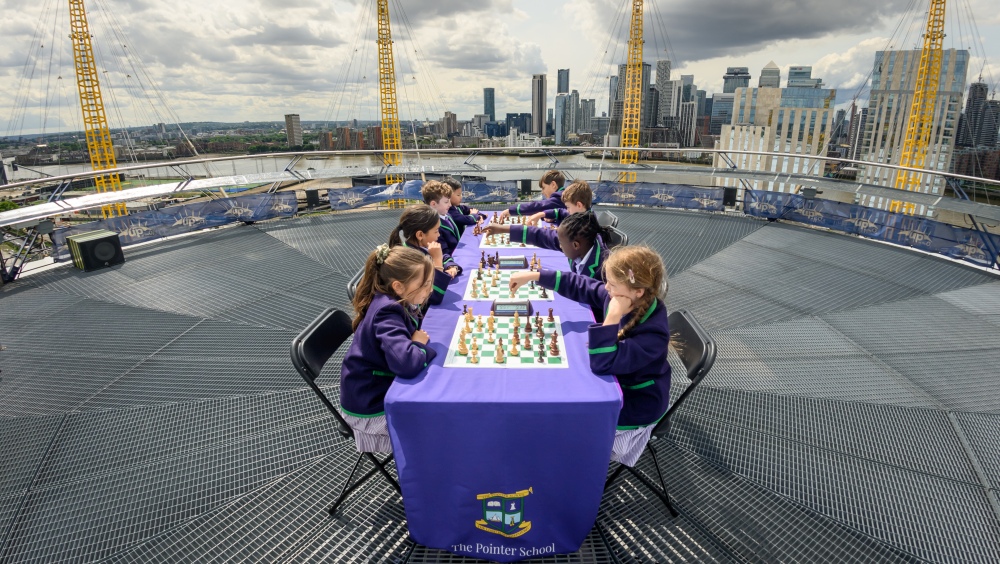
From the classroom to the sky: Chess in the curriculum School children have taken chess to extraordinary new heights (quite literally), going head-to-head in a game of chess, 52 meters above London on top of the O2 Arena, to promote the ancient strategy game’s benefits in education and for the launch of a new chess club initiative! Under sunny skies, Pointers’ students played on top of the London landmark, but the real achievement lies not in the altitude but in promoting the many cognitive benefits that come with playing the game. The high-stakes game marks the launch of The Pointer School’s commitment to making chess more widely available in the community, by opening their doors to an after-school chess club for other pupils in Greenwich and South East London areas, free of charge. Open to passionate chess players of primary school age, the chess club aims to give young people who otherwise would not have access to structured chess coaching an opportunity to master this universal game of strategy. The Pointer School, a leading prep school in South London that forms part of the Dukes Education group, celebrates their 75th anniversary this year. The school has a proud history and record when it comes to chess, with former student, Shreyas Royal having become England’s youngest ever chess grandmaster – aged just 15 years old. Pointers student, Kushal Jakhria, is competing in this year’s FIDE World Rapid and Blitz Championships in London this June. As well as the full team making it to the finals of English Primary School Chess Association (EPSCA) National Primary Schools’ Championships 2025, further demonstrating the prep school’s chess success. The Pointer School offers world-class guidance and instructions for budding chess players, both within the curriculum and through extracurricular activities. As well as helping Shreyas Royal to hone his skills, the school has a proven track record of success in chess, with former pupils going on to excel at regional, national, and even international levels. Studies have shown that playing chess can deepen your focus, improve your memory and enhance critical thinking, which can translate into everyday life, as well as the game of chess itself. Charlotte Crookes, Headteacher at The Pointer School, said: “Our chess club is about much more than the game itself, it’s part of our panoramic curriculum, giving every child a chance to discover their interests and thrive intellectually, socially and emotionally; and celebrating what’s possible when communities come together. “Chess offers a number of cognitive benefits that can translate to greater performance in other elements of education, be it concentration, problem-solving or boosting creativity, as well as valuable life skills around critical thinking, planning and logical reasoning. “What better way to launch our chess club than to play a game at the top of one of London’s most recognized landmarks? The Pointer School has taken chess to new heights, but you wouldn’t catch me going up there!” Selection for the chess club, which began with the symbolic O2 Arena showdown, will be based on passion, potential, and above all else, curiosity in the game of chess! Children from across the Greenwich and South East London area are invited to join the after-school club, and they will be given access to expert coaching, as well as opportunities for competitive play. Jerzy Dybowski, chess tutor at The Pointer School, said: “Chess builds confident learners and thoughtful decision-makers. We’re proud of our heritage, but even more proud to be part of something bigger, something that reaches beyond our school walls.” Spaces for the chess club are limited but available for all primary school age pupils, and anyone who is interested in registering their interest for this initiative can visit The Pointer School website: pointers.school/about/chess-club Website: pointers.school/Instagram: @pointerschoolFacebook: facebook.com/ThePointerSchool/ LinkedIn: linkedin.com/company/the-pointer-school/?viewAsMember=true About The Pointer School Founded in 1950, The Pointer School is an independent co-educational school in Blackheath, Greenwich, South East London. It is known for its strong academic record, panoramic educational approach, and thriving arts and sports programmes. In 2025, it celebrates 75 years of nurturing curious minds and fostering a spirit of opportunity for all. The Pointer School is part of the Dukes Education family, the largest premium education group in the UK and one of the fastest-growing families of schools in Europe. Dukes Education was founded by Aatif Hassan in 2015 to give young people an outstanding start in life. The Group now has 62 education brands and over 80 settings, across nine countries, supporting more than 21,000 pupils and 5,000 staff. Dukes also operates a number of leading summer short courses, university and medical school consultancies, immersive career experience providers, and one-to-one student support offerings, creating a cradle-to-career suite of services.
Chess world descends on London for FIDE World Rapid and Blitz Team Championships

London is set to host the FIDE World Rapid and Blitz Team Championships from 10th to 16th June, bringing together top world players, chess legends and emerging talents. Launched in 2023 by The International Chess Federation (FIDE), the event has grown quickly, attracting companies and organisations from around the world that have assembled teams made up of players of all levels, from die-hard professionals to recreational enthusiasts. In 2024, the World Blitz Teams championship was added to the event, which resulted in more teams taking part and an increased prize pool. The third edition of the event will see 54 teams take part, with each numbering nine players, including one female player and one amateur (with a FIDE rating of under 2000 ELO). The total prize fund is €500,000 (£421,000), €310,000 will go to the Rapid tournament, €190,000 is earmarked for the Blitz. Who is playing? The lineup for the event includes many of the world’s top players, with 116 Grandmasters. The field is led by the WR Chess Team – winners of the 2023 Rapid and the 2024 Blitz Championship. Steered by the experienced German coach and GM, Jan Gustafsson, WR Chess has assembled the world’s strongest GMs. Starting with World No 2 rated Hikaru Nakamura (pictured below), WR Chess also has Alireza Firouzja, Ian Nepomniachtchi, Maxime Vachier-Lagrave, Wesley So, Jan-Krzysztof Duda as well as former women’s world champions, Alexandra Kosteniuk and Hou Yifan. For the third year in a row, team owner Wadim Rosenstein will take charge of the non-professional board. With an average rating of nearly 2700, they are the absolute favourites. Photo: Michal Walusza Hexamind, a new entrant, fields chess heavyweights such as Levon Aronian, Leinier Dominguez Perez, Anish Giri and Vidit Santosh Gujrathi. The team has focused on the future of chess, with the inclusion of 18-year-old Volodar Murzin (who won the 2024 World Rapid Chess Championship) and brothers Platon (9) and Mark (5) Panarin. KazChess from Kazakhstan has Richard Rapport, Alexander Grischuk and Parham Maghsoodloo on the top three boards, while Freedom – who won second place in the 2023 Rapid – will have the former world champion Viswanathan Anand on board one. Captained by GM Emil Sutovsky, the team also includes Le Quang Liem, Samuel Sevian, Rauf Mamedov and former women’s world Rapid and Blitz champion, Anna Muzychuk (pictured below). Photo: Mark Livshitz Team MGD1, a strong contender in the previous two editions (securing third place in 2023), has restructured to adopt a more international lineup. While Arjun Erigaisi is still on board one, with Pentala Harikrishna on board two, Spain’s David Anton is on board three while Stavroula Tsolakidou from Greece is on the women’s board. Another strong contender is the team of Uzbekistan, fielding the strongest Uzbek players – Abdusattorov, Sindarov and Kasimdzhanov. Other world-class players participating in the event include former world champion candidate Boris Gelfand, England’s 2700-player Luke McShane as well as former world champion candidate Nigel Short and world-class players, Alexei Shirov and Shakhriyar Mamedyarov. The schedule: First the Rapid, then the Blitz The event will start on Wednesday, 11th June, with the World Rapid Teams Championship. The 12-round Swiss tournament will span three days, with four rounds played daily, and a time control of 15 minutes plus a 10-second increment per move. Then, the World Blitz Teams will then take place – on 14-15th June, featuring a two-phase structure: a round-robin group stage followed by knockouts. The teams will be divided into pools of approximately the same strength, with 16 squads qualifying for the knockout stage. The time control in the Blitz is sharp: three minutes for the whole game, with a two-second increment per move. A step in the right direction The London event follows successful editions in Düsseldorf (2023) and Astana (2024). “FIDE and our partners are proud to bring the third edition of the World Rapid and Blitz Teams tournament to London, an important global hub for chess. After the Global Chess League in October 2024, this is another major international chess event we are hosting in London,” FIDE President Arkady Dvorkovich said. “With nearly 60 teams – not just from chess organisations but also private companies – taking part, this event is a step in the right direction to promote chess globally and build bridges among people”, Dvorkovich added. How to watch/attend The event will be streamed live on FIDE’s YouTube channel with expert commentary by GMs Daniel King and Jovanka Houska, while tickets for the rounds can be purchased here: tickets.fide.com/. The tournament is taking place in Novotel London West, located in Hammersmith in West London. Official website: worldrapidblitzteams2025.fide.com/
Serbian Championship: Ivan Ivanisevic and Sofia Pogorelskikh win titles

GM Ivan Ivanisevic and IM Sofia Pogorelskikh are the new champions of Serbia. Ivanisevic claimed his fifth national crown, while Pogorelskikh earned her first. The open and women’s events—both round-robins with classical time control—were held simultaneously from May 31 to June 6, but in different cities: Pirot and Palic, respectively. Second seed Ivanisevic delivered a solid performance, pulling away after scoring three consecutive victories in Rounds 5–7. Heading into the final round half a point ahead of GM Suat Atalik (whom he had defeated in their direct encounter), he drew with GM Misa Pap to finish with 6.5/9. Meanwhile, Atalik defeated Andrei Gaivoronkii in the last round to catch up with the leader. Ivanisevic and Atalik tied for first place, but Ivanisevic secured the title thanks to a superior tiebreak (Koya system). Notably, he was the only unbeaten player in the tournament. Top seed Robert Marcus completed the podium, taking bronze. Final standings – Open The women’s event was a fiercely contested competition. Suffice it to say, even the champion, Sofia Pogorelskikh, lost two games. To her credit, she compensated with five victories and finished clear first, half a point ahead of 2024 champion WGM Irina Chelushkina and 2023 champion WGM Marina Gajcin, who tied for second place. The Koya system favored Chelushkina, who took silver, while Gajcin settled for bronze. Final standings – Women Photos: Šahovski Savez Srbije
Magnus Carlsen and Anna Muzychuk triumph at Norway Chess 2025

Magnus Carlsen has taken his seventh Norway Chess title after a thrilling final round, while the last-year runner-up Anna Muzychuk won the Norway Chess Women 2025. The 13th edition of this prestigious competition took place in Stavanger, Norway, from May 26 to June 6. Both tournaments were 6-player double-round robins with equal prize funds. Each round consisted of a classical game, with a win worth 3 points and a loss – 0. In the case of a draw, the players played an Armageddon game, where the winner scored 1½ points, and the loser got just 1 point, with a draw favouring Black. Norway Chess 2025 proved to be fiercely competitive, with no player finishing the event unbeaten. Heading into the final round, Magnus Carlsen held a half-point lead over Gukesh D and was paired against Arjun Erigaisi, while Gukesh faced Fabiano Caruana. Carlsen found himself in a lost position with Black in a Queen’s Gambit Declined, but the momentum shifted quickly. With only seconds remaining on his clock, he took a draw—seemingly enough to secure the title, as Caruana held a winning position against Gukesh. However, a dramatic twist followed: Caruana blundered, equalizing the game, but Gukesh erred just two moves later and capitulated soon. With these results, Magnus Carlsen clinched his seventh title, while Fabiano Caruana leapfrogged Gukesh D and finished second. The World Champion had to settle for third place. Norway Chess 2025 – Final Standings: 1 Magnus Carlsen NOR 16 2 Fabiano Caruana USA 15½ 3 Gukesh Dommaraju IND 14½ 4 Hikaru Nakamura USA 14 5 Arjun Erigaisi IND 13 6 Wei Yi CHN 9½ Anna Muzychuk, the only undefeated player in the women’s event, was in command throughout and came to the final round two points ahead of Humpy Koneru. She made draws in both classical and Armageddon against GM Vaishali Rameshbabu, and secured the title, as Koneru drew her classical game with Ju Wenjun as well. Meanwhile, Lei Tingjie won on demand with Black against Sara Khademalshariehin and overtook Koneru to take second place. Norway Chess Women 2025 – Final Standings: 1 Anna Muzychuk UKR 16½ 2 Lei Tingjie CHN 16 3 Humpy Koneru IND 15 4 Ju Wenjun CHN 13½ 5 Vaishali Rameshbabu IND 11 6 Sarasadat Khademalsharieh ESP 9 Photos: Norway Chess / Roza Czarnota and Michal Walusza Official website: https://norwaychess.no/en/
FIDE Grand Swiss 2025: Lists of qualified players announced
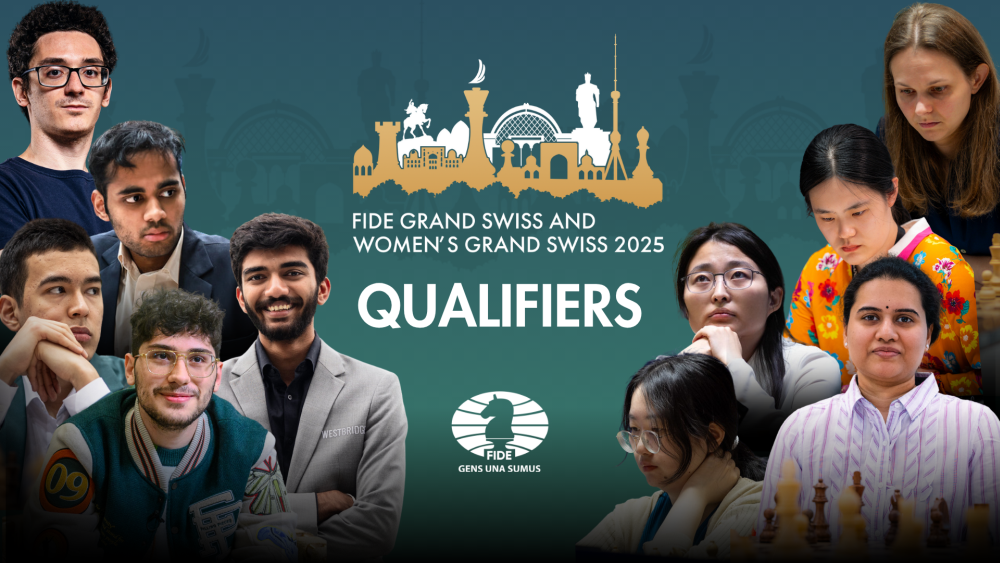
The 2025 FIDE Grand Swiss and Women’s Grand Swiss will take place in Samarkand, Uzbekistan, from September 3–16, 2025. This marks the first time the prestigious event will be held in Uzbekistan, a country with a rich chess heritage and a rapidly growing influence in the global chess community. As one of the most significant events in the chess calendar, the FIDE Grand Swiss offers players a direct pathway to the Candidates Tournament. The top two finishers in the Grand Swiss will secure spots in the 2026 Candidates Tournament, while the top two players in the Women’s Grand Swiss will qualify for the 2026 Women’s Candidates Tournament. In addition to its importance as a qualifier, the event will feature an increased prize fund. The Open prize fund has been boosted from $460,000 to $625,000—a 36% increase—while the Women’s prize fund sees an even larger jump, from $140,000 to $230,000, up 64%. Both tournaments will follow an 11-round Swiss format, with 170 players participating from across the globe: 114 in the Grand Swiss and 56 in the Women’s Grand Swiss. So far, 100 players have qualified for the 2025 Grand Swiss by rating, while the Women’s Grand Swiss has 44 qualifiers. Only players who played at least 30 rated games are eligible. The final lists of participants will be confirmed after Continent spots, players nominated by the FIDE President and players nominated by the Organiser are announced. Qualified players – Open https://grandswiss2025.fide.com/open-event-participants/ Qualified players – Women https://grandswiss2025.fide.com/women-event-participants/ Official website: grandswiss2025.fide.com/
World IPCA Individual Championship 2025: Registration now open

The Chess Federation for Physically Disabled (CFPD), in collaboration with the Department for Empowerment of Persons with Disabilities (Dept. of EPWD), Goa Chess Association for Persons with Disabilities (GCAPD), and under the auspices of the All India Chess Federation (AICF), Asian Chess Federation (ACF), International Physically Disabled Chess Association (IPCA) and FIDE, invites all national chess federations to participate in the Goa Purple – 24th World IPCA Individual Chess Championship. Championship details: Dates: July 21-31, 2025 Venue: International Centre Goa, Dona Paula, India Eligibility: Players with physical disabilities of 50% or higher, representing their national chess federations/associations Total prize fund: USD 15,000 Tournament Format: The championship will feature three competition categories: Standard: 90 minutes + 30-second increment Rapid:15 minutes + 10-second increment Blitz: 5 minutes + 3-second increment All events will follow a 9-round Swiss system. World IPCA Individual Chess Championship 2025 Schedule: Registration: National federations must complete the official registration form Deadline: June 30, 2025 (for players and accompanying persons) Submit to: divyangchess@gmail.com and divyangchessgoa@gmail.com Three best federations overall, by ranking of medals collected in all categories among men, women, juniors and girls, will receive trophies. For ranking, the number of gold medals will be considered first, and if there is a tie, then the number of silver medals, and if there is still a tie, then the number of bronze medals. Invitation letter, regulations, prizes (PDF)

